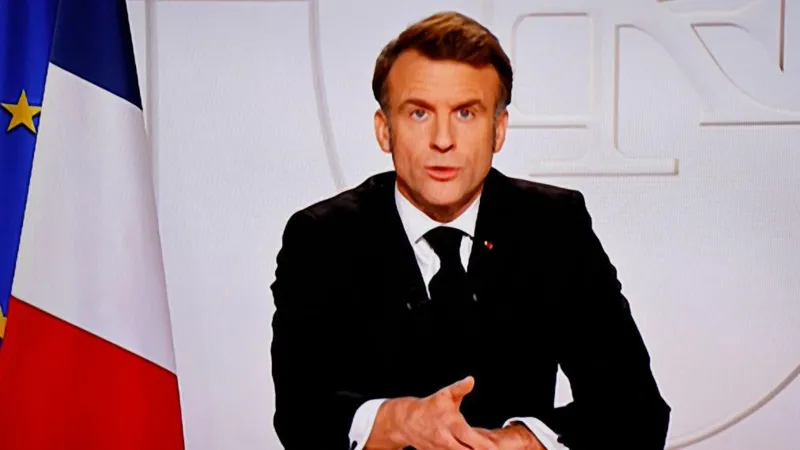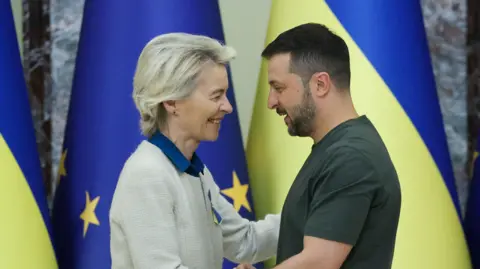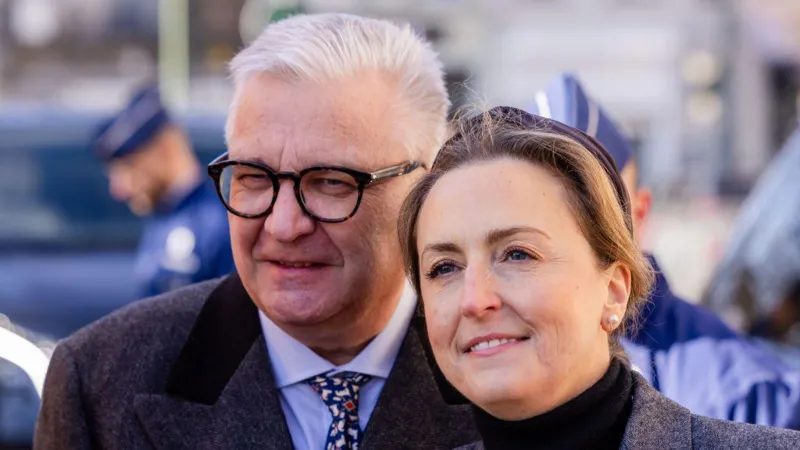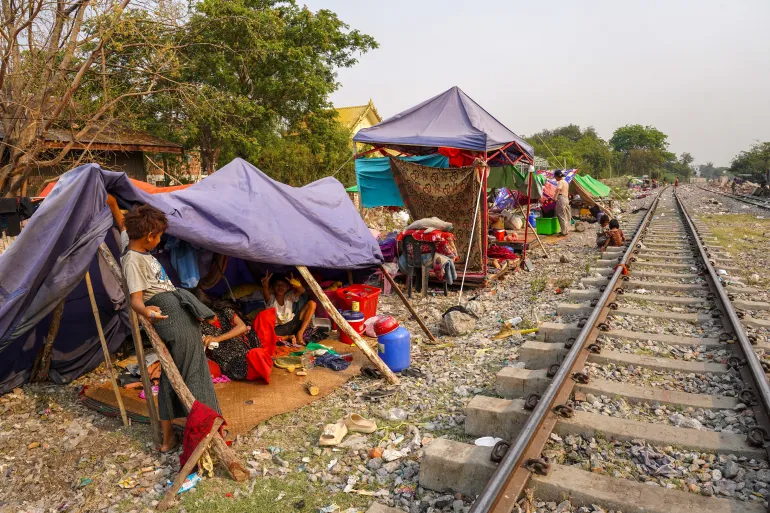Foreign News
Europe ‘at turning point in history’, French president warns

EU leaders are gathering in Brussels today [06] for a special council on defence, as France’s President Emmanuel Macron warned that the continent was at a “turning point of history”.
As well as rearmament, leaders are expected to discuss how the body can further support Kyiv in the face of US President Donald Trump’s announcement on Monday that he would suspend aid to Ukraine. Ukrainian President Volodymy Zelensky is invited to the summit.
Nerves have grown increasingly frayed across Europe since Trump and Zelensky’s showdown at the White House last week, and the rhetoric around Thursday’s summit leaves no doubt about the importance EU officials are ascribing to it.
Three years on since Russia’s full scale invasion of Ukraine, the Trump administration’s overtures to Russian President Vladimir Putin have left many in Europe concerned the continent would not be able to rely on US support for its security.
Washington’s decision on Wednesday topause intelligence sharing with Ukraine did nothing to allay those worries.
In a sign of the depth of concern, President Macron said France was open to discussing extending the protection offered by its nuclear arsenal to its European partners, during an address to the nation on Wednesday.
That followed a call from Friedrich Merz, likely to be Germany’s next chancellor, to discuss increased nuclear sharing.
Europe was facing a “clear and present danger on a scale that none of us have seen in our adult lifetime”, European Commission chief Ursula von der Leyen said, while European Council President António Costa said this was a “defining moment for Ukraine and European security”.
In a letter to European leaders, von der Leyen also said the continent had to “meet the moment” and “unleash our industrial and productive power and direct it to the goal of security”.
On Monday, von der Leyen announced an unprecedented defence package – dubbed ReArm Europe – and said that Europe was ready to “massively” boost its defence spending “with the speed and the ambition that is needed”.
Von der Leyen said the three proposals outlined in the ReArm Europe plan would both support Ukraine and “address the long-term need to take much more responsibility” for European security – likely referring to the fact many Europeans feel the continent can no longer automatically rely on the US to come to its aid.
The proposals include:
- Allowing countries to increase national deficit levels to give room for more defence spending
- €150bn (£125bn) in loans for defence investment in domains that could benefit the defence of the EU as a whole – for example, air and missile defence, anti-drone systems, and military mobility – helping pool demand, and reduce costs through joint procurement
- Allowing countries to redirect funds earmarked for cohesion policy programmes (policies aimed at levelling the differences between more and less advantaged regions) to defence spending
The European Investment Bank would also be allowed to finance military projects.

According to von der Leyen, the plan could free up a total of €800bn ($860bn; £670bn) in defence expenditure.
Many European leaders have signalled their support for swift, decisive action in regards to the continent’s security.
Donald Tusk, Poland’s prime minister, said the Commission’s plan represented “a fundamental shift”, while Lithuanian President Gitanas Nauseda said that the summit would give Europe the opportunity to show “whether it’s just a debate club or whether we can make decisions”.
But dissent from certain European leaders sympathetic to Moscow is expected.
Earlier this week, Slovakian Prime Minister Robert Fico said the EU’s “peace through strength” approach was “unrealistic”.
And in a letter to Costa, Hungary’s Viktor Orban demanded that Ukraine not be mentioned in any written conclusions following the summit.
Orban – who has repeatedly attempted to block EU aid to Ukraine and has praised Trump for “standing bravely for peace” – said there was now a “strategic divide… between the majority of Europe and the USA”.
“One side insists on prolonging the war in Ukraine, while the other seeks an end to the conflict,” he added.
Yet Orban left the door open for a “greater probability for cooperation” with other leaders over issues of common security and defence.
While Thursday’s crisis summit is taking place in Brussels, UK Defence Secretary John Healey will be in Washington for discussions with his counterpart Pete Hegseth on the US decision to pause intelligence sharing with Ukraine.
Their bilateral meeting will focus on a possible peace plan while efforts continue to bridge a transatlantic rift over Kyiv’s future security.
Perhaps in a final bid to try and achieve unity ahead of the summit, Emmanuel Macron – who has positioned himself at the centre of the EU’s efforts to bridge the gap between Kyiv and Washington – invited Orban to have dinner in Paris on Wednesday evening.
The two leaders met immediately after the French president gave a sombre address to the nation in which he said that France and Europe needed to be ready if the US was no longer by their side.
“We have to be united and determined to protect ourselves,” Macron said. He added that the future of Europe could not be tied to Washington or Moscow, and said that while he “wanted to believe that the US will stay by our side, we have to be ready for this not to be the case”.
The French president plans to hold a meeting of European army chiefs in Paris next week.
Macron said that “decisive steps” would be taken in Brussels, leaving European countries “more ready to defend and protect themselves”.
“The moment calls for unprecedented decisions,” he concluded.
[BBC]
Foreign News
Belgian prince loses bid for benefits on top of £300k royal allowance

A Belgian prince’s attempt to claim social security benefits on top of his six-figure royal allowance has been rejected by a court.
Prince Laurent – the younger brother of King Philippe – received €388,000 (£295,850; $376,000) from state funds last year but said that his work entitles him and his family to social security.
He had argued that he was partly self-employed because of the duties he carries out as a royal, as well as running an animal welfare charity for the past decade.
Laurent, 61, said he was acting out of “principle” rather than for money. The court disagreed.
“When a migrant comes here, he registers, he has a right to social security,” he told Belgian broadcaster RTBF.
“I may be a migrant too, but one whose family established the state in place.”
But on Monday a court in Brussels turned down Laurent’s request on the grounds that the prince can be considered neither self-employed nor an employee.
However, according to broadcaster VTM the judge acknowledged that the prince should actually be entitled to a pension – but said gaps in legislation made that impossible and called for the law to be amended.
His lawyer, Olivier Rijckaert, told Belgian newspaper Le Soir that Laurent’s request had not been based on a “whim” and insisted on its symbolism, saying that social security is “granted by Belgian law to all residents, from the most deprived to the richest”.
Mr Rijckaert also said that most of the prince’s allowance is spent on his assistant’s salary and various travel expenses.
This means Laurent is left with about €5000 (£4300; $5500) a month but no social security benefits, such as the right to claim back some medical expenses.
The prince – who has three adult children with British-born wife Claire Coombs – has also expressed his concerns over his family’s wellbeing since the royal allowance will be cut when he dies.
Laurent took legal action against the Belgian state after his application for social security was refused. A first hearing was held in November 2024.
According to RTBF, the prince and his legal counsel have not yet decided whether to appeal the court’s decision.
Laurentm who is the 15th in the Belgian line of succession, is no stranger to controversy and is sometimes termed the prince maudit – the “cursed prince” – in Belgium.
In 2018, the Belgian federal parliament voted to dock his monthly allowance for a year after he attended a Chinese embassy reception without government permission, in full naval uniform.
He has also racked up several speeding fines and has been criticised for attending meetings in Libya when the late Muammar Gaddafi was still in power.
[BBC]
Foreign News
Rains add to misery in quake-hit Myanmar as death toll rises to 3,471

Heavy rains have lashed parts of earthquake-hit Myanmar, complicating relief efforts and raising the risk of disease as the death toll from the powerful quakes that struck the country on March 28 rose to at least 3,471.
Aid workers in the hard-hit city of Mandalay, near the epicentre of the earthquake, said on Sunday that rains and winds hit tent camps in the area overnight and in the morning, soaking survivors and their belongings.
More bouts of rain were expected later in the day, while temperatures were also forecast to climb to 37 degrees Celsius (98 degrees Fahrenheit).
“The weather is very extreme,” Tun Tun, a specialist with the United Nations Development Programme, told the AFP news agency.
Aid agencies have warned the combination of unseasonable rains and extreme heat could cause outbreaks of disease, including cholera, among quake survivors, who are camping in the open.
The magnitude 7.7 earthquake hit a wide swath of Myanmar, home to 50 million people, causing significant damage to six regions and states, including the capital, Naypyidaw.
It left many areas without power, telephone or mobile phone connections, and damaged roads and bridges, making the full extent of the devastation hard to assess. It also worsened an already dire humanitarian crisis triggered by the country’s civil war that has internally displaced more than three million people and left nearly 20 million in need, according to the UN.
State media in the military-led country now say the earthquake has caused 3,471 deaths and injured 4,671 people, while 214 remain missing.
It has damaged some 5,223 buildings, 1,824 schools, 4,817 pagodas and temples, 167 hospitals and clinics, 169 bridges, 198 dams and 184 sections of the country’s main highway.

Damage has been particularly severe in the city of Sagaing near the epicentre, as well as in Mandalay, Myanmar’s second-largest city.
UN aid chief Tom Fletcher, who is in Mandalay, described the scale of the damage as “epic” and said survivors, who are “traumatised and fearful”, need food, water, shelter and electricity urgently.
In a video posted to X, Fletcher noted the quake had brought devastation to communities that were already in crisis. “It’s a compounding crisis,” he said. “It’s earthquake, on top of conflict, on top of huge existing need.”
[Aljazeera]
Foreign News
Zimbabwe to scrap tariffs on US goods as it faces 18% Trump levy
Zimbabwe’s President Emmerson Mnangagwa has announced he will suspend tariffs on goods imported from the US in an attempt to build a “positive relationship” with President Donald Trump’s administration.
The move comes days after Trump imposed 18% tariffs on Zimbabwean exports to the US.
“This measure is intended to facilitate the expansion of American imports within the Zimbabwean market, while simultaneously promoting the growth of Zimbabwean exports destined for the United States,” Mnangagwa said on X.
Zimbabwe has had strained diplomatic relations with the US since it adopted a controversial land policy about 25 years ago, and because of its poor human rights record.
Trade between the two countries amounted to only $111.6m (£86.6m) in 2024, US government data shows.
The US exported goods worth $43.8m to Zimbabwe in 2024, up 10.6% from the previous year, while imports were down 41% to $67.8m.
Zimbabwean political analyst Tendai Mbanje told AFP news agency that the decision would not result in substantial economic benefits for Zimbabwe and would would only benefit the US.
Prominent Zimbabwean journalist and government critic Hopewell Chin’ono said the president appeared to be trying to “appease” the Trump administration.
Mnangawa possibly hopes that the administration would lift sanctions imposed on him, but it was a “long shot”, he added on X.
[BBC]
-

 Business3 days ago
Business3 days agoColombo Coffee wins coveted management awards
-

 Business5 days ago
Business5 days agoDaraz Sri Lanka ushers in the New Year with 4.4 Avurudu Wasi Pro Max – Sri Lanka’s biggest online Avurudu sale
-

 Features4 days ago
Features4 days agoStarlink in the Global South
-

 Business6 days ago
Business6 days agoStrengthening SDG integration into provincial planning and development process
-

 Business5 days ago
Business5 days agoNew SL Sovereign Bonds win foreign investor confidence
-

 Sports7 days ago
Sports7 days agoTo play or not to play is Richmond’s decision
-

 Features4 days ago
Features4 days agoModi’s Sri Lanka Sojourn
-

 Midweek Review12 hours ago
Midweek Review12 hours agoInequality is killing the Middle Class











